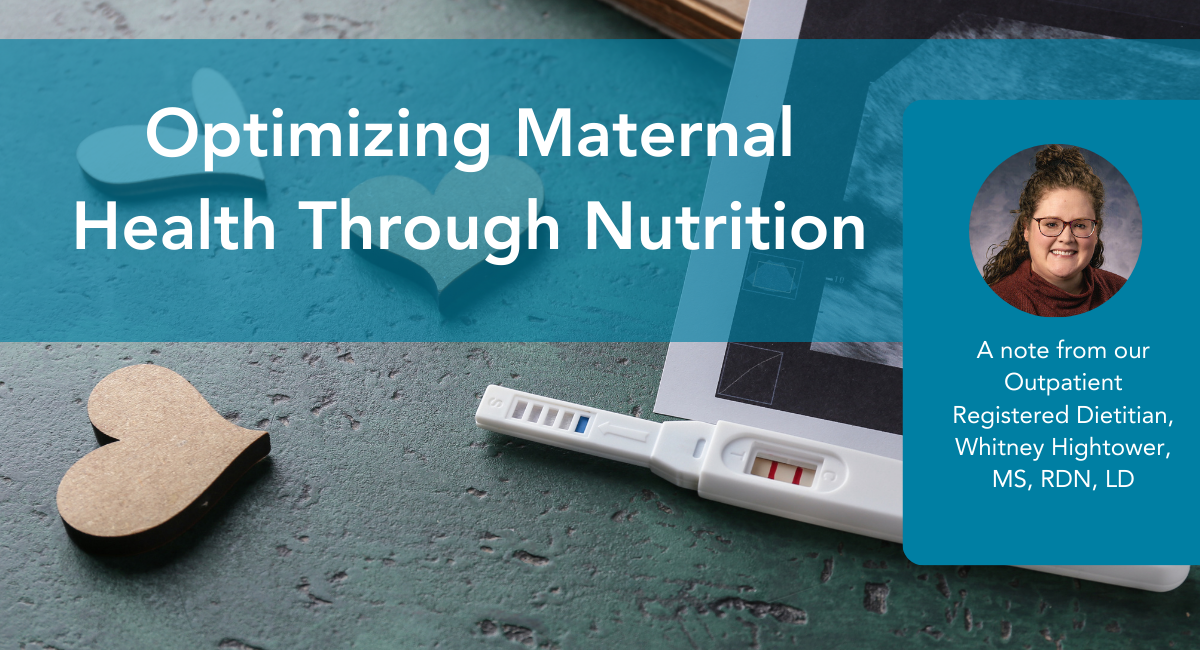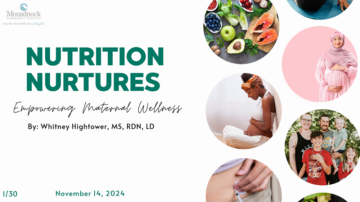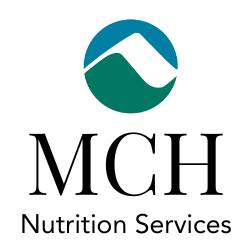Nutrition for Maternal Health: A Comprehensive Guide

Wellness Wednesday: Wellness Tips
![]() At Monadnock Community Hospital, we believe that wellness isn’t just a destination—it’s a journey we embark on together. That’s why we’ve launched our Wellness Wednesday campaign, an initiative designed to inspire, inform, and empower our community to lead healthier, happier lives.
At Monadnock Community Hospital, we believe that wellness isn’t just a destination—it’s a journey we embark on together. That’s why we’ve launched our Wellness Wednesday campaign, an initiative designed to inspire, inform, and empower our community to lead healthier, happier lives.
Pregnancy is a journey that requires increased physical, emotional, and nutritional support. Nutrition significantly impacts maternal health, fetal development, and postpartum recovery. By understanding the role of essential nutrients and creating balanced dietary habits, mothers can improve their own well-being and that of their children.
This comprehensive guide explores trimester-specific dietary needs, the importance of macronutrients and micronutrients, and strategies to overcome common nutritional challenges during pregnancy and beyond.
Download the presentation from our Nutrition Nurtures seminar
The Foundations of Maternal Nutrition
Three principles guide maternal nutrition: adequacy, variety, and balance.
- Adequacy: Ensuring sufficient energy and nutrients to support growth and development.
- Variety: Eating diverse foods to meet vitamin and mineral needs.
- Balance: Including the right proportions of macronutrients and micronutrients.
Energy Needs During Pregnancy
Energy requirements vary by trimester:
- First Trimester: Caloric needs align with nonpregnant levels. Small, frequent meals help manage nausea.
- Second and Third Trimesters: Additional 150–300 calories per day may be needed. Focus on nutrient-dense foods like lean proteins, whole grains, and healthy fats.
- Postpartum (Fourth Trimester): Energy needs increase with chestfeeding and wound healing. Up to 400 extra calories daily may be necessary.
Macronutrients: Building Blocks of Maternal Health
- Protein (10–35% of total intake): Essential for fetal tissue growth. Include lean meats, beans, and eggs.
- Carbohydrates (45–65% of intake): Provide energy and support digestion with fiber-rich options like whole grains and vegetables.
- Fats (20–35% of intake): Focus on unsaturated fats (avocados, nuts, fatty fish). Limit saturated fats to less than 10% of total intake.
Micronutrients: Vital for Development
Key nutrients for pregnancy include:
- Folate: Supports DNA synthesis and prevents neural tube defects. Found in leafy greens and fortified cereals.
- Iron: Prevents anemia and supports oxygen delivery. Found in eggs, lean meats, and spinach. Pair with foods with vitamin C for enhanced iron absorption. For example, a lemon juice and olive oil vinaigrette on a spinach salad.
- Calcium and Vitamin D: Strengthen bones and teeth. Dairy products and fortified foods are excellent sources.
- Omega-3 Fatty Acids: Critical for fetal brain and eye development. Found in fatty fish like salmon.
- Choline, Zinc and Iodine: Essential for hormone balance and cell function. Found in seafood, lean meat and eggs. For those following a plant-based diet, choline and zinc can also be found in nuts and seeds while iodine can be found in iodized table salt; a little goes a long way for this trace mineral.
Trimester-Specific Challenges and Strategies
- First Trimester:
- Challenges: Nausea, vomiting, and fatigue due to hormonal changes.
- Strategies: Eat small, frequent meals; stay hydrated; opt for low-fat, bland foods.
- Second Trimester:
- Challenges: Increased appetite and insulin resistance.
- Strategies: Reintroduce a variety of foods, focus on iron-rich meals, and enjoy light physical activity.
- Third Trimester:
- Challenges: Heartburn, back pain, and increased fatigue.
- Strategies: Eat protein-rich meals, manage reflux with smaller meals, and prioritize hydration.
- Postpartum (Fourth Trimester):
- Challenges: Nutrient depletion, anemia, and energy recovery.
- Strategies: Focus on iron-rich foods, omega-3 fatty acids, and hydration for lactation.
The Role of a Registered Dietitian (RD)
A Registered Dietitian provides:
- Personalized nutritional assessments.
- Customized plans tailored to trimester-specific needs.
- Support for managing conditions like gestational diabetes.
Applying Maternal Nutrition Principals: Meal Ideas
The following meal and snack suggestions encourage adequate intake of key macro- and micronutrients, important for maternal health and wellbeing.
Breakfast:
- Spinach and avocado scramble with berries.
- Oatmeal with flaxseed, almond butter, and banana.
Lunch:
- Quinoa salad with roasted vegetables and chickpeas.
- Grilled chicken salad with mixed greens, avocado, and goat cheese.
Dinner:
- Salmon with roasted Brussels sprouts and farro salad.
- Stir-fry with tofu, mushrooms, and brown rice.
Snacks:
- Greek yogurt with chia seeds and honey.
- Fresh fruit with nut butter.
Benefits of Nutrition During Pregnancy
Studies highlight the profound impact of a healthy diet:
- Reduced risks of gestational diabetes, hypertension, and preterm birth.
- Improved fetal growth and maternal recovery.
- Enhanced birth outcomes and long-term health for both mother and baby.
Maternal nutrition is an empowering tool for mothers to optimize their health and nurture their baby’s development. By following evidence-based dietary strategies and seeking professional guidance from a Registered Dietitian, mothers can confidently navigate their pregnancy journey.
Resources
- American Pregnancy Association
Comprehensive information about nutrition during pregnancy, including specific recommendations for vitamins and minerals.
https://americanpregnancy.org - Centers for Disease Control and Prevention (CDC): Pregnancy Nutrition
Offers evidence-based guidelines for maintaining a healthy diet during pregnancy.
https://www.cdc.gov/pregnancy/ - Academy of Nutrition and Dietetics: Nutrition for Pregnancy
Provides professional resources and tips for expecting mothers.
https://www.eatright.org/health/pregnancy - March of Dimes: Healthy Eating During Pregnancy
Focuses on balanced diets and managing common pregnancy-related challenges.
https://www.marchofdimes.org - National Institutes of Health (NIH): Maternal Nutrition and Pregnancy Outcomes
Scientific insights into how nutrition impacts pregnancy outcomes.
https://www.nih.gov - HealthyChildren.org: Nutrition During Pregnancy
From the American Academy of Pediatrics, addressing how diet supports a healthy pregnancy.
https://www.healthychildren.org - World Health Organization (WHO): Pregnancy Nutrition
Global guidelines on maternal nutrition and health.
https://www.who.int
About the Birthing Suite at Monadnock Community Hospital
At Monadnock Community Hospital, our Birthing Suite is designed to provide a warm, family-centered environment for one of life’s most memorable experiences. We combine state-of-the-art medical care with a compassionate, personalized approach to ensure the safety, comfort, and well-being of both mother and baby.
Our team of highly skilled obstetricians, nurses, and support staff are committed to creating a nurturing experience, offering services like private labor and delivery rooms, 24/7 access to experienced medical professionals, and advanced pain management options. Whether you’re a first-time parent or adding to your family, our Birthing Suite is dedicated to supporting you every step of the way, with resources to promote confidence and comfort during your childbirth journey.
About Nutrition Services at Monadnock Community Hospital
Our Nutrition Services team is dedicated to empowering individuals and families to make informed choices that support their health and wellness goals. Whether you’re managing a chronic condition, seeking guidance for maternal nutrition, or simply aiming to enhance your overall well-being, our outpatient registered dietitians are here to provide expert support.
Through personalized nutrition counseling, we address a wide range of needs, from diabetes management and heart health to weight management and food allergies. Our science-based approach ensures that you receive the most up-to-date and actionable advice, tailored to your unique circumstances. At Monadnock Community Hospital, we’re committed to helping you achieve a balanced, healthy lifestyle through compassionate, collaborative care.
Array
(
[section_title] =>
[section_text] =>
[posts_selection] => auto_taxonomy_terms
[section_posts] => Array
(
[0] => WP_Post Object
(
[ID] => 40917
[post_author] => 9192204
[post_date] => 2025-10-20 14:56:42
[post_date_gmt] => 2025-10-20 18:56:42
[post_content] =>
[post_title] => Video: Together for Breast Health Seminar: Understanding Symptoms, Screenings, and Solutions
[post_excerpt] =>
[post_status] => publish
[comment_status] => closed
[ping_status] => closed
[post_password] =>
[post_name] => breast-health-seminar-video-2025
[to_ping] =>
[pinged] =>
[post_modified] => 2025-10-20 15:28:13
[post_modified_gmt] => 2025-10-20 19:28:13
[post_content_filtered] =>
[post_parent] => 0
[guid] => https://monadnockcommunityhospital.com/?p=40917
[menu_order] => 0
[post_type] => post
[post_mime_type] =>
[comment_count] => 0
[filter] => raw
)
[1] => WP_Post Object
(
[ID] => 40901
[post_author] => 9192204
[post_date] => 2025-10-15 15:33:33
[post_date_gmt] => 2025-10-15 19:33:33
[post_content] =>
[post_title] => Video: Strong Steps — A Seminar on Fracture and Fall Prevention
[post_excerpt] =>
[post_status] => publish
[comment_status] => closed
[ping_status] => closed
[post_password] =>
[post_name] => fall-prevention-seminar-video-2025
[to_ping] =>
[pinged] =>
[post_modified] => 2025-10-15 17:36:47
[post_modified_gmt] => 2025-10-15 21:36:47
[post_content_filtered] =>
[post_parent] => 0
[guid] => https://monadnockcommunityhospital.com/?p=40901
[menu_order] => 0
[post_type] => post
[post_mime_type] =>
[comment_count] => 0
[filter] => raw
)
[2] => WP_Post Object
(
[ID] => 40690
[post_author] => 9192204
[post_date] => 2025-09-22 10:31:18
[post_date_gmt] => 2025-09-22 14:31:18
[post_content] =>
[post_title] => National Children’s Health Day: 5 Ways to Keep Kids Growing Strong
[post_excerpt] =>
[post_status] => publish
[comment_status] => closed
[ping_status] => closed
[post_password] =>
[post_name] => childrens-health-2025
[to_ping] =>
[pinged] =>
[post_modified] => 2025-09-10 15:35:51
[post_modified_gmt] => 2025-09-10 19:35:51
[post_content_filtered] =>
[post_parent] => 0
[guid] => https://monadnockcommunityhospital.com/?p=40690
[menu_order] => 0
[post_type] => post
[post_mime_type] =>
[comment_count] => 0
[filter] => raw
)
[3] => WP_Post Object
(
[ID] => 40666
[post_author] => 9192204
[post_date] => 2025-08-23 09:27:11
[post_date_gmt] => 2025-08-23 13:27:11
[post_content] =>
[post_title] => In the News: Labor and delivery units face uncertainty after federal cuts
[post_excerpt] =>
[post_status] => publish
[comment_status] => closed
[ping_status] => closed
[post_password] =>
[post_name] => news-delivery-unit-closures-2025
[to_ping] =>
[pinged] =>
[post_modified] => 2025-09-10 15:31:35
[post_modified_gmt] => 2025-09-10 19:31:35
[post_content_filtered] =>
[post_parent] => 0
[guid] => https://monadnockcommunityhospital.com/?p=40666
[menu_order] => 0
[post_type] => post
[post_mime_type] =>
[comment_count] => 0
[filter] => raw
)
[4] => WP_Post Object
(
[ID] => 40632
[post_author] => 9192204
[post_date] => 2025-08-19 13:06:29
[post_date_gmt] => 2025-08-19 17:06:29
[post_content] =>
[post_title] => Back to School Health Tips for Kids: Hygiene, Sleep & More
[post_excerpt] =>
[post_status] => publish
[comment_status] => closed
[ping_status] => closed
[post_password] =>
[post_name] => back-to-school-2025
[to_ping] =>
[pinged] =>
[post_modified] => 2025-08-27 11:07:42
[post_modified_gmt] => 2025-08-27 15:07:42
[post_content_filtered] =>
[post_parent] => 0
[guid] => https://monadnockcommunityhospital.com/?p=40632
[menu_order] => 0
[post_type] => post
[post_mime_type] =>
[comment_count] => 0
[filter] => raw
)
[5] => WP_Post Object
(
[ID] => 40432
[post_author] => 9192204
[post_date] => 2025-07-23 07:20:56
[post_date_gmt] => 2025-07-23 11:20:56
[post_content] =>
[post_title] => Why Immunization Is Important: Protecting Health Across Every Age
[post_excerpt] =>
[post_status] => publish
[comment_status] => closed
[ping_status] => closed
[post_password] =>
[post_name] => immunization-awareness-month-2025
[to_ping] =>
[pinged] =>
[post_modified] => 2025-09-10 15:40:09
[post_modified_gmt] => 2025-09-10 19:40:09
[post_content_filtered] =>
[post_parent] => 0
[guid] => https://monadnockcommunityhospital.com/?p=40432
[menu_order] => 0
[post_type] => post
[post_mime_type] =>
[comment_count] => 0
[filter] => raw
)
[6] => WP_Post Object
(
[ID] => 40278
[post_author] => 9192204
[post_date] => 2025-06-20 11:00:11
[post_date_gmt] => 2025-06-20 15:00:11
[post_content] =>
[post_title] => 2025 DAISY Award Ceremony Honors Extraordinary Nurses
[post_excerpt] =>
[post_status] => publish
[comment_status] => closed
[ping_status] => closed
[post_password] =>
[post_name] => the-daisy-award-2025
[to_ping] =>
[pinged] =>
[post_modified] => 2025-08-20 11:27:23
[post_modified_gmt] => 2025-08-20 15:27:23
[post_content_filtered] =>
[post_parent] => 0
[guid] => https://monadnockcommunityhospital.com/?p=40278
[menu_order] => 0
[post_type] => post
[post_mime_type] =>
[comment_count] => 0
[filter] => raw
)
[7] => WP_Post Object
(
[ID] => 40279
[post_author] => 9192204
[post_date] => 2025-06-09 13:26:35
[post_date_gmt] => 2025-06-09 17:26:35
[post_content] =>
[post_title] => Video: Navigating Menopause with Expert Insights from an OB/GYN
[post_excerpt] =>
[post_status] => publish
[comment_status] => closed
[ping_status] => closed
[post_password] =>
[post_name] => menopause-seminar-video-2025
[to_ping] =>
[pinged] =>
[post_modified] => 2025-10-20 14:56:35
[post_modified_gmt] => 2025-10-20 18:56:35
[post_content_filtered] =>
[post_parent] => 0
[guid] => https://monadnockcommunityhospital.com/?p=40279
[menu_order] => 0
[post_type] => post
[post_mime_type] =>
[comment_count] => 0
[filter] => raw
)
[8] => WP_Post Object
(
[ID] => 39860
[post_author] => 9192204
[post_date] => 2025-06-04 08:38:23
[post_date_gmt] => 2025-06-04 12:38:23
[post_content] =>
[post_title] => Balanced Nutrition for Optimal Health: What You Need to Know
[post_excerpt] =>
[post_status] => publish
[comment_status] => closed
[ping_status] => closed
[post_password] =>
[post_name] => balanced-nutrition-for-optimal-health
[to_ping] =>
[pinged] =>
[post_modified] => 2025-08-20 11:18:11
[post_modified_gmt] => 2025-08-20 15:18:11
[post_content_filtered] =>
[post_parent] => 0
[guid] => https://monadnockcommunityhospital.com/stress-management-techniques-that-work-copy/
[menu_order] => 0
[post_type] => post
[post_mime_type] =>
[comment_count] => 0
[filter] => raw
)
[9] => WP_Post Object
(
[ID] => 40167
[post_author] => 9192204
[post_date] => 2025-05-14 20:00:30
[post_date_gmt] => 2025-05-15 00:00:30
[post_content] =>
[post_title] => Video: Understanding & Managing Lymphedema Seminar with MCH
[post_excerpt] =>
[post_status] => publish
[comment_status] => closed
[ping_status] => closed
[post_password] =>
[post_name] => lymphedema-seminar-video-2025
[to_ping] =>
[pinged] =>
[post_modified] => 2025-09-10 15:45:26
[post_modified_gmt] => 2025-09-10 19:45:26
[post_content_filtered] =>
[post_parent] => 0
[guid] => https://monadnockcommunityhospital.com/?p=40167
[menu_order] => 0
[post_type] => post
[post_mime_type] =>
[comment_count] => 0
[filter] => raw
)
[10] => WP_Post Object
(
[ID] => 39856
[post_author] => 9192204
[post_date] => 2025-05-07 08:01:51
[post_date_gmt] => 2025-05-07 12:01:51
[post_content] =>
[post_title] => Effective Stress Management Techniques to Improve Well-Being
[post_excerpt] =>
[post_status] => publish
[comment_status] => closed
[ping_status] => closed
[post_password] =>
[post_name] => stress-management-techniques-that-work
[to_ping] =>
[pinged] =>
[post_modified] => 2025-09-10 15:23:20
[post_modified_gmt] => 2025-09-10 19:23:20
[post_content_filtered] =>
[post_parent] => 0
[guid] => https://monadnockcommunityhospital.com/nutrition-tips-for-seniors-healthy-aging-copy/
[menu_order] => 0
[post_type] => post
[post_mime_type] =>
[comment_count] => 0
[filter] => raw
)
[11] => WP_Post Object
(
[ID] => 40093
[post_author] => 9192204
[post_date] => 2025-05-01 11:49:07
[post_date_gmt] => 2025-05-01 15:49:07
[post_content] =>
[post_title] => Key Statistics 2024
[post_excerpt] =>
[post_status] => publish
[comment_status] => closed
[ping_status] => closed
[post_password] =>
[post_name] => key-statistics-2025
[to_ping] =>
[pinged] =>
[post_modified] => 2025-09-10 15:34:33
[post_modified_gmt] => 2025-09-10 19:34:33
[post_content_filtered] =>
[post_parent] => 0
[guid] => https://monadnockcommunityhospital.com/?p=40093
[menu_order] => 0
[post_type] => post
[post_mime_type] =>
[comment_count] => 0
[filter] => raw
)
[12] => WP_Post Object
(
[ID] => 40026
[post_author] => 9192204
[post_date] => 2025-04-10 15:34:30
[post_date_gmt] => 2025-04-10 19:34:30
[post_content] =>
[post_title] => In the News: Birthing Education Classes Return to Monadnock Community Hospital
[post_excerpt] =>
[post_status] => publish
[comment_status] => closed
[ping_status] => closed
[post_password] =>
[post_name] => news-birthing-education-classes-monadnock-250406
[to_ping] =>
[pinged] =>
[post_modified] => 2025-09-10 15:30:28
[post_modified_gmt] => 2025-09-10 19:30:28
[post_content_filtered] =>
[post_parent] => 0
[guid] => https://monadnockcommunityhospital.com/?p=40026
[menu_order] => 0
[post_type] => post
[post_mime_type] =>
[comment_count] => 0
[filter] => raw
)
[13] => WP_Post Object
(
[ID] => 40023
[post_author] => 9192204
[post_date] => 2025-04-10 14:31:34
[post_date_gmt] => 2025-04-10 18:31:34
[post_content] =>
[post_title] => Video: Colorectal Cancer Awareness & Prevention Seminar
[post_excerpt] =>
[post_status] => publish
[comment_status] => closed
[ping_status] => closed
[post_password] =>
[post_name] => colon-cancer-awarenes-video-2025
[to_ping] =>
[pinged] =>
[post_modified] => 2025-09-10 15:45:12
[post_modified_gmt] => 2025-09-10 19:45:12
[post_content_filtered] =>
[post_parent] => 0
[guid] => https://monadnockcommunityhospital.com/?p=40023
[menu_order] => 0
[post_type] => post
[post_mime_type] =>
[comment_count] => 0
[filter] => raw
)
[14] => WP_Post Object
(
[ID] => 39853
[post_author] => 9192204
[post_date] => 2025-04-02 17:45:32
[post_date_gmt] => 2025-04-02 21:45:32
[post_content] =>
[post_title] => Fall Prevention for Older Adults: Tips to Stay Safe and Independent
[post_excerpt] =>
[post_status] => publish
[comment_status] => closed
[ping_status] => closed
[post_password] =>
[post_name] => fall-prevention-tips-for-seniors
[to_ping] =>
[pinged] =>
[post_modified] => 2025-09-10 15:24:43
[post_modified_gmt] => 2025-09-10 19:24:43
[post_content_filtered] =>
[post_parent] => 0
[guid] => https://monadnockcommunityhospital.com/nutrition-tips-for-seniors-healthy-aging-copy/
[menu_order] => 0
[post_type] => post
[post_mime_type] =>
[comment_count] => 0
[filter] => raw
)
[15] => WP_Post Object
(
[ID] => 39949
[post_author] => 9192204
[post_date] => 2025-03-25 10:58:08
[post_date_gmt] => 2025-03-25 14:58:08
[post_content] =>
[post_title] => In the News: Monadnock Community Hospital launches ‘Slam the Scam’ anti-fraud effort
[post_excerpt] =>
[post_status] => publish
[comment_status] => closed
[ping_status] => closed
[post_password] =>
[post_name] => news-slam-the-scam-250324
[to_ping] =>
[pinged] =>
[post_modified] => 2025-09-10 15:31:45
[post_modified_gmt] => 2025-09-10 19:31:45
[post_content_filtered] =>
[post_parent] => 0
[guid] => https://monadnockcommunityhospital.com/?p=39949
[menu_order] => 0
[post_type] => post
[post_mime_type] =>
[comment_count] => 0
[filter] => raw
)
[16] => WP_Post Object
(
[ID] => 39920
[post_author] => 9192204
[post_date] => 2025-03-20 14:56:46
[post_date_gmt] => 2025-03-20 18:56:46
[post_content] =>
[post_title] => Slam the Scam: How to Spot & Avoid Fraudulent Calls
[post_excerpt] =>
[post_status] => publish
[comment_status] => closed
[ping_status] => closed
[post_password] =>
[post_name] => protect-against-healthcare-scams
[to_ping] =>
[pinged] =>
[post_modified] => 2025-09-10 15:36:26
[post_modified_gmt] => 2025-09-10 19:36:26
[post_content_filtered] =>
[post_parent] => 0
[guid] => https://monadnockcommunityhospital.com/?p=39920
[menu_order] => 0
[post_type] => post
[post_mime_type] =>
[comment_count] => 0
[filter] => raw
)
[17] => WP_Post Object
(
[ID] => 39802
[post_author] => 9192204
[post_date] => 2025-02-26 13:53:23
[post_date_gmt] => 2025-02-26 18:53:23
[post_content] =>
[post_title] => Nutrition for Seniors - Expert Tips for Healthy Aging
[post_excerpt] =>
[post_status] => publish
[comment_status] => closed
[ping_status] => closed
[post_password] =>
[post_name] => nutrition-tips-for-seniors-healthy-aging
[to_ping] =>
[pinged] =>
[post_modified] => 2025-09-10 15:35:48
[post_modified_gmt] => 2025-09-10 19:35:48
[post_content_filtered] =>
[post_parent] => 0
[guid] => https://monadnockcommunityhospital.com/heart-health-tips-5-steps-for-a-healthy-heart-copy/
[menu_order] => 0
[post_type] => post
[post_mime_type] =>
[comment_count] => 0
[filter] => raw
)
[18] => WP_Post Object
(
[ID] => 39807
[post_author] => 9192204
[post_date] => 2025-02-19 07:47:01
[post_date_gmt] => 2025-02-19 12:47:01
[post_content] =>
[post_title] => Early Detection of Colorectal Cancer: Why Screening at 45 Saves Lives
[post_excerpt] =>
[post_status] => publish
[comment_status] => closed
[ping_status] => closed
[post_password] =>
[post_name] => early-detection-colorectal-cancer-screening
[to_ping] =>
[pinged] =>
[post_modified] => 2025-08-28 13:15:27
[post_modified_gmt] => 2025-08-28 17:15:27
[post_content_filtered] =>
[post_parent] => 0
[guid] => https://monadnockcommunityhospital.com/colorectial-cancer-awareness-prevention-seminar-2024-copy/
[menu_order] => 0
[post_type] => post
[post_mime_type] =>
[comment_count] => 0
[filter] => raw
)
[19] => WP_Post Object
(
[ID] => 39843
[post_author] => 9192204
[post_date] => 2025-02-16 11:34:47
[post_date_gmt] => 2025-02-16 16:34:47
[post_content] =>
[post_title] => Where Comfort Meets Care: Monadnock’s Award-Winning Birthing Suite
[post_excerpt] =>
[post_status] => publish
[comment_status] => closed
[ping_status] => closed
[post_password] =>
[post_name] => monadnock-birthing-suite-award-winning-care
[to_ping] =>
[pinged] =>
[post_modified] => 2025-09-10 15:40:07
[post_modified_gmt] => 2025-09-10 19:40:07
[post_content_filtered] =>
[post_parent] => 0
[guid] => https://monadnockcommunityhospital.com/monadnock-birthing-suite-serene-childbirth-copy/
[menu_order] => 0
[post_type] => post
[post_mime_type] =>
[comment_count] => 0
[filter] => raw
)
[20] => WP_Post Object
(
[ID] => 39798
[post_author] => 9192204
[post_date] => 2025-02-12 12:37:10
[post_date_gmt] => 2025-02-12 17:37:10
[post_content] =>
[post_title] => 5 Small Changes for a Healthier Lifestyle This Year
[post_excerpt] =>
[post_status] => publish
[comment_status] => closed
[ping_status] => closed
[post_password] =>
[post_name] => healthy-lifestyle-changes-5-easy-steps
[to_ping] =>
[pinged] =>
[post_modified] => 2025-08-20 11:07:11
[post_modified_gmt] => 2025-08-20 15:07:11
[post_content_filtered] =>
[post_parent] => 0
[guid] => https://monadnockcommunityhospital.com/heart-health-tips-5-steps-for-a-healthy-heart-copy/
[menu_order] => 0
[post_type] => post
[post_mime_type] =>
[comment_count] => 0
[filter] => raw
)
[21] => WP_Post Object
(
[ID] => 39796
[post_author] => 9192204
[post_date] => 2025-02-10 12:17:06
[post_date_gmt] => 2025-02-10 17:17:06
[post_content] =>
[post_title] => 5 Tips to Improve Your Heart Health During Heart Health Month
[post_excerpt] =>
[post_status] => publish
[comment_status] => closed
[ping_status] => closed
[post_password] =>
[post_name] => heart-health-tips-5-steps-for-a-healthy-heart
[to_ping] =>
[pinged] =>
[post_modified] => 2025-08-20 11:07:17
[post_modified_gmt] => 2025-08-20 15:07:17
[post_content_filtered] =>
[post_parent] => 0
[guid] => https://monadnockcommunityhospital.com/wellness-wednesday-copy/
[menu_order] => 0
[post_type] => post
[post_mime_type] =>
[comment_count] => 0
[filter] => raw
)
[22] => WP_Post Object
(
[ID] => 39698
[post_author] => 9192204
[post_date] => 2025-01-08 09:56:23
[post_date_gmt] => 2025-01-08 14:56:23
[post_content] =>
[post_title] => Take Charge of Your Heart: Preventing Heart Disease in February
[post_excerpt] =>
[post_status] => publish
[comment_status] => closed
[ping_status] => closed
[post_password] =>
[post_name] => heart-health-month-prevention-tips-2025
[to_ping] =>
[pinged] =>
[post_modified] => 2025-09-10 15:36:37
[post_modified_gmt] => 2025-09-10 19:36:37
[post_content_filtered] =>
[post_parent] => 0
[guid] => https://monadnockcommunityhospital.com/?p=39698
[menu_order] => 0
[post_type] => post
[post_mime_type] =>
[comment_count] => 0
[filter] => raw
)
[23] => WP_Post Object
(
[ID] => 39693
[post_author] => 9192204
[post_date] => 2025-01-05 09:59:13
[post_date_gmt] => 2025-01-05 14:59:13
[post_content] =>
[post_title] => Reflecting on a Year of Care: Stories of Compassion and Community
[post_excerpt] =>
[post_status] => publish
[comment_status] => closed
[ping_status] => closed
[post_password] =>
[post_name] => celebrating-2024-compassionate-care-stories
[to_ping] =>
[pinged] =>
[post_modified] => 2025-09-10 15:36:18
[post_modified_gmt] => 2025-09-10 19:36:18
[post_content_filtered] =>
[post_parent] => 0
[guid] => https://monadnockcommunityhospital.com/patient-stories-copy/
[menu_order] => 0
[post_type] => post
[post_mime_type] =>
[comment_count] => 0
[filter] => raw
)
[24] => WP_Post Object
(
[ID] => 39214
[post_author] => 9192204
[post_date] => 2024-12-16 08:26:06
[post_date_gmt] => 2024-12-16 13:26:06
[post_content] =>
[post_title] => Safe Use of Opioids for Pain Management
[post_excerpt] =>
[post_status] => publish
[comment_status] => closed
[ping_status] => closed
[post_password] =>
[post_name] => safe-opioid-use-pain-management
[to_ping] =>
[pinged] =>
[post_modified] => 2025-09-10 15:36:22
[post_modified_gmt] => 2025-09-10 19:36:22
[post_content_filtered] =>
[post_parent] => 0
[guid] => https://monadnockcommunityhospital.com/common-causes-joint-pain-copy/
[menu_order] => 0
[post_type] => post
[post_mime_type] =>
[comment_count] => 0
[filter] => raw
)
[25] => WP_Post Object
(
[ID] => 39472
[post_author] => 9192204
[post_date] => 2024-11-20 14:14:54
[post_date_gmt] => 2024-11-20 19:14:54
[post_content] =>
[post_title] => Nutrition for Maternal Health: A Comprehensive Guide
[post_excerpt] =>
[post_status] => publish
[comment_status] => closed
[ping_status] => closed
[post_password] =>
[post_name] => nutrition-for-maternal-health-2024
[to_ping] =>
[pinged] =>
[post_modified] => 2025-09-10 15:35:48
[post_modified_gmt] => 2025-09-10 19:35:48
[post_content_filtered] =>
[post_parent] => 0
[guid] => https://monadnockcommunityhospital.com/jaundice-newborn-care-pediatricscopy-copy/
[menu_order] => 0
[post_type] => post
[post_mime_type] =>
[comment_count] => 0
[filter] => raw
)
[26] => WP_Post Object
(
[ID] => 39471
[post_author] => 9192204
[post_date] => 2024-11-19 12:43:03
[post_date_gmt] => 2024-11-19 17:43:03
[post_content] =>
[post_title] => Discover Serenity: Monadnock Birthing Suite for Your Childbirth Journey
[post_excerpt] =>
[post_status] => publish
[comment_status] => closed
[ping_status] => closed
[post_password] =>
[post_name] => monadnock-birthing-suite-serene-childbirth
[to_ping] =>
[pinged] =>
[post_modified] => 2025-09-12 11:36:17
[post_modified_gmt] => 2025-09-12 15:36:17
[post_content_filtered] =>
[post_parent] => 0
[guid] => https://monadnockcommunityhospital.com/family-focused-care-birthing-suite-video-copy/
[menu_order] => 0
[post_type] => post
[post_mime_type] =>
[comment_count] => 0
[filter] => raw
)
[27] => WP_Post Object
(
[ID] => 39455
[post_author] => 9192204
[post_date] => 2024-11-13 09:24:30
[post_date_gmt] => 2024-11-13 14:24:30
[post_content] =>
[post_title] => The Importance Of Getting Your Flu Shot This Season
[post_excerpt] =>
[post_status] => publish
[comment_status] => closed
[ping_status] => closed
[post_password] =>
[post_name] => importance-of-getting-your-flu-shot-2024
[to_ping] =>
[pinged] =>
[post_modified] => 2025-09-10 15:36:44
[post_modified_gmt] => 2025-09-10 19:36:44
[post_content_filtered] =>
[post_parent] => 0
[guid] => https://monadnockcommunityhospital.com/?p=39455
[menu_order] => 0
[post_type] => post
[post_mime_type] =>
[comment_count] => 0
[filter] => raw
)
[28] => WP_Post Object
(
[ID] => 39232
[post_author] => 9192201
[post_date] => 2024-10-30 12:06:37
[post_date_gmt] => 2024-10-30 16:06:37
[post_content] =>
[post_title] => Diabetes Awareness Month: Understanding, Preventing, and Managing Diabetes
[post_excerpt] =>
[post_status] => publish
[comment_status] => closed
[ping_status] => closed
[post_password] =>
[post_name] => diabetes-awareness-month-prevention-management
[to_ping] =>
[pinged] =>
[post_modified] => 2025-08-28 13:14:43
[post_modified_gmt] => 2025-08-28 17:14:43
[post_content_filtered] =>
[post_parent] => 0
[guid] => https://monadnockcommunityhospital.com/?p=39232
[menu_order] => 0
[post_type] => post
[post_mime_type] =>
[comment_count] => 0
[filter] => raw
)
[29] => WP_Post Object
(
[ID] => 39211
[post_author] => 9192204
[post_date] => 2024-10-23 16:31:05
[post_date_gmt] => 2024-10-23 20:31:05
[post_content] =>
[post_title] => Supporting Maternal Health During Prematurity Awareness Month
[post_excerpt] =>
[post_status] => publish
[comment_status] => closed
[ping_status] => closed
[post_password] =>
[post_name] => supporting-maternal-health-prematurity-awareness-month
[to_ping] =>
[pinged] =>
[post_modified] => 2025-09-10 15:36:35
[post_modified_gmt] => 2025-09-10 19:36:35
[post_content_filtered] =>
[post_parent] => 0
[guid] => https://monadnockcommunityhospital.com/jaundice-newborn-care-pediatricscopy-copy/
[menu_order] => 0
[post_type] => post
[post_mime_type] =>
[comment_count] => 0
[filter] => raw
)
)
[posts_limit] => 30
[post_type] => post
[taxonomy] => tag
[terms] => monadnock family pediatrics, pediatric health, the birthing suite, nutrition, wellness wednesday
[section_id] => post-grid-14
)



